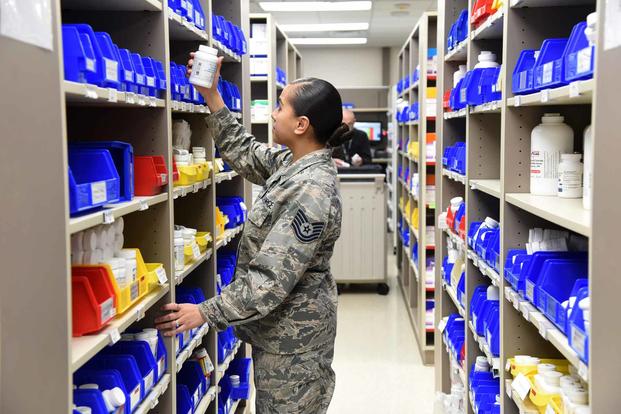Nearly 15,000 Pharmacies Leaving Tricare in October

Thousands of independent and community pharmacies are poised to be dropped from Tricare‘s pharmacy network next month in a move advocates say could leave patients in rural areas with few options to get prescriptions filled.
Effective Oct. 24, 14,963 retail pharmacies will no longer participate in Tricare’s pharmacy network, Defense Health Agency spokesperson Peter Graves confirmed in an emailed statement.
“Despite this change, the Tricare retail network will continue to meet or exceed Tricare’s standard for pharmacy access,” Graves added. “Beneficiaries will continue to have many convenient, local in-network options for filling their medications, including those beneficiaries in rural locations.”
Read Next: These Are the Most Popular Bases New Soldiers Are Volunteering For
In a separate emailed statement, a spokesperson for Express Scripts, which manages pharmacy benefits for Tricare, pledged the company will “support any impacted beneficiaries in finding an in-network pharmacy to fill their prescriptions.”
“Tricare beneficiaries will maintain access to nearly 41,000 chain, grocery store and independent pharmacies, as well as home delivery and military pharmacies,” the Express Scripts statement said. “More than 90% of beneficiaries will have a pharmacy within a 15-minute drive time of their home.”
Express Scripts started notifying affected beneficiaries this month, Graves said, adding that those who have specialty medications at one of the departing pharmacies “will receive assistance from Express Scripts in transferring those prescriptions to a network pharmacy.”
The change in pharmacy coverage could affect nearly 400,000 Tricare beneficiaries, according to the Military Officers Association of America.
One of those affected is Michael Spatz, a retired Air Force colonel with Tricare for Life coverage whose wife has metastatic breast cancer. They have been using a local pharmacy in Alexandria, Virginia, to fill her prescription for Kisqali, a daily pill that stops the growth and spread of the cancer. While Express Scripts filled the prescription through its mail order pharmacy for the first two months, Spatz said the company stopped because of the drug’s cost, which can run thousands of dollars a month.
Their initial reaction when their local pharmacy told them it wouldn’t be in-network anymore was “holy crap, we need to get this medicine,” Spatz said.
CVS Specialty, which his wife’s oncologist suggested they use to replace the local pharmacy, initially gave the couple the “runaround” but has since filled the prescription, Spatz said. As a former Air Force doctor and former executive at Humana Military, he also tapped his connections for help getting answers on Tricare coverage.
While that means there won’t be a lapse in his wife’s medication now, he worries what will happen if there’s an issue in the future without the personal touch of a local pharmacist. He also said he worries about other patients living somewhere with fewer options than Alexandria and with fewer connections than him.
“We have patients who are not going to get their meds because they don’t know how to work the system in a timely fashion at all,” Spatz said.
While some independent pharmacies knew they would be dropped from Tricare next year because they wouldn’t accept the terms of Express Scripts’ contract, many have been blindsided by the Oct. 24 date, said Ronna Hauser, senior vice president of policy and pharmacy affairs at the National Community Pharmacists Association, an advocacy group for independent pharmacies. Many found out by patients bringing them letters from Express Scripts and have struggled to get answers directly from the company, she added.
“It’s just not a smooth transition process,” Hauser said. “It’s very abrupt. There’s no clear answers. It’s causing a lot of frustration for our members, and we know, hearing through our members, it’s causing a lot of frustration for patients.”
— Rebecca Kheel can be reached at ">. Follow her on Twitter @reporterkheel.

No comments yet.